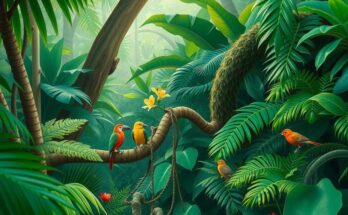Rorisang Mahomo, a business student from Lesotho studying at the University of Pretoria, discovered a new asteroid in the Main Asteroid Belt. Her involvement with Blue Crane Space facilitated her participation in an asteroid search initiative, reflecting the role of citizen scientists in astronomy. Mahomo aspires to name the asteroid after herself and plans to pursue postgraduate business studies while maintaining her interest in space science.
Rorisang Mahomo, a 20-year-old final-year business management student at the University of Pretoria in South Africa, has made a groundbreaking discovery in astronomy. Originally from Lesotho, she detected a new asteroid orbiting the Sun, located approximately 300 million kilometers away in the Main Asteroid Belt between Mars and Jupiter. This achievement highlights that one does not need to be a natural sciences expert to contribute significantly to space exploration.
Her discovery was made possible through her involvement with the Blue Crane Space (BCS) society at the University of Pretoria, where she received support and resources to analyze astronomical images. This endeavor is part of the International Astronomical Search Collaboration, an initiative that encourages citizen scientists to participate in asteroid detection. Mahomo’s potential asteroid, currently designated as ‘2023 QY50’, has been officially recorded in the Minor Planet Center database maintained by the International Astronomical Union at Harvard University.
Rorisang reflected on her initial reaction to the discovery, noting a delightful mix of excitement and disbelief. She expressed pride not only in her personal achievement but also in representing her homeland, Lesotho. Furthermore, she emphasized the importance of persistence in pursuing passions, regardless of one’s field of study.
Following her discovery, Mahomo is now focused on her postgraduate studies in business, while maintaining her interest in astronomy as a fulfilling hobby. This achievement serves as a motivating example of how interdisciplinary collaboration and curiosity can lead to significant discoveries that enrich our understanding of the universe.
The discovery of asteroids is a vital aspect of planetary defense, as these celestial objects can pose risks to Earth. The Minor Planet Center, funded by NASA, plays a crucial role in cataloging such discoveries made by citizen scientists globally. The identification and tracking of asteroids facilitate the development of strategies to safeguard Earth from potential impacts, an issue underscored by historical events such as the extinction of the dinosaurs due to an asteroid strike. Mahomo’s success illustrates how non-science students can engage in significant scientific contributions, thereby breaking traditional barriers in STEM fields.
Rorisang Mahomo’s discovery of an asteroid underscores the significance of interdisciplinary collaboration and highlights the potential of citizen scientists in astronomical research. Her journey from a business student to an asteroid detector inspires others to pursue their passions beyond their primary fields of study. As she prepares for postgraduate education while remaining involved in astronomy, her story emphasizes the importance of curiosity and opportunity in driving scientific exploration.
Original Source: www.universityworldnews.com




